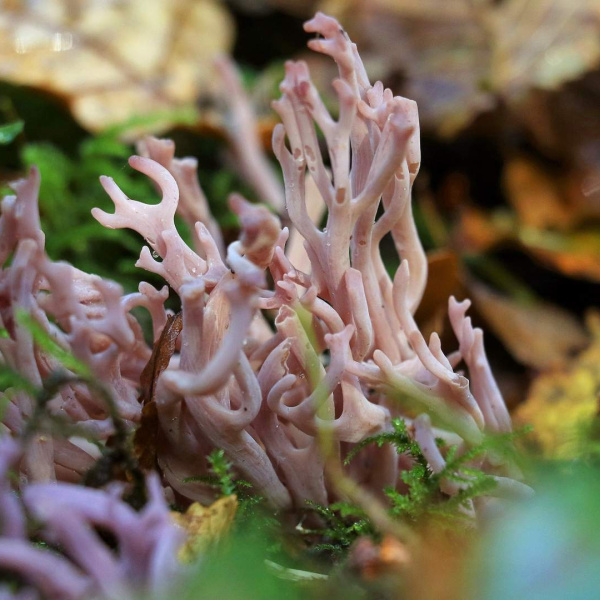One of the UK’s rarest fungi, which looks like an underwater coral, has been unexpectedly found in woodland belonging to international animal welfare charity, The Donkey Sanctuary.
The violet coral, Clavaria zollingeri, was recently discovered by one of the charity’s conservation officers, Helen Cavilla, at Paccombe Farm which is home to more than 350 donkeys.
The sighting is only the second time this fungus has been recorded in Devon, whilst other records are from just a handful of sites across the UK.
The violet coral is scarce and one of the UK’s rarest fungi species. The fungi’s global population is decreasing and it is listed as ‘Vulnerable’ on the IUCN (International Union for Conservation of Nature) Red List of Threatened Species and Global Fungi Red List. Threats include habitat loss, pollution, agricultural intensification, over-exploitation and climate change.
The striking pinky-purple fungus, which is about the size of a cauliflower and boasts finger-like projections, tends to be found in old, unfertilised grasslands, which are themselves rare habitats under threat from agricultural improvement, disturbance and development.
This specimen was found in a broadleaved woodland which is managed by the charity’s conservation team.
Helen explained: ““I spotted something looking oddly like it was from an aquarium nestled amongst moss and leaf litter. It was really exciting to realise what it was when I got closer.”
Dr David Farley of the Devon Fungus Group explained: “The violet coral is one of our most beautiful fungi and can scarcely be confused with any other species.
“It is very rare in south-west England and usually confined to upland areas so its appearance at The Donkey Sanctuary is especially unusual. In 40 years of observing wild fungi, I've only seen this species once before. A remarkable find.”
As well as the violet coral, conservation staff have found many waxcap fungi this year, and many of these are in donkey grazed fields.
Waxcaps belong to a group of mushrooms known for their waxy appearance and assortment of bright colours of reds, pinks, orange, yellows and white, like jewels amongst the grass.
Helen added: “I was also pleased to find other interesting mushroom species popping up through donkey droppings, efficiently recycling the nutrients locked within and releasing them back into the soil on which they sit. The benefits of managing grassland for both donkeys and biodiversity is beautifully apparent throughout the seasons”.
This type of habitat is also excellent for donkeys because they are adapted to thrive on the high fibre low nutrient grazing which unimproved grassland offers, as well as benefitting from the enrichment which foraging amongst the diverse grasses and wildflowers gives them.
For interviews, images and information please contact The Donkey Sanctuary press office on 01395 573124 or 07870 849563 (including out of hours) or send an email.
The Donkey Sanctuary is the world's largest equine welfare charity. Our vision is a world where donkeys and mules live free from suffering and their contribution to humanity is fully valued. We run 10 sanctuaries around the UK and Europe, giving lifelong care to more than 7,000 donkeys and mules. Our hospital treats sick donkeys and trains vets both nationwide and worldwide. Our donkey-facilitated learning programme helps vulnerable children and adults develop life skills by connecting with donkeys on an emotional and physical level. The charity operates programmes worldwide for animals working in agriculture, industry and transportation, and those used in the production of meat and skin.
Please note that the name ‘The Donkey Sanctuary’ should not be abbreviated to ‘Donkey Sanctuary’, and the word ‘The’ should always appear with a capital ‘T’ as above.
